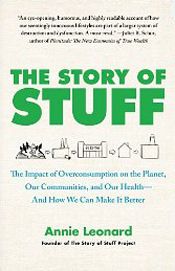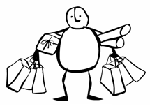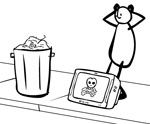THE STORY OF STUFF by Annie Leonard – Book Review
 Sub-titled How Our Obsession with Stuff is Trashing Our Planet, Our Communities, and Our Health — and a Vision for Change
Sub-titled How Our Obsession with Stuff is Trashing Our Planet, Our Communities, and Our Health — and a Vision for Change
 An expansion of the 20 minute Internet film of the same name, the book The Story of Stuff
An expansion of the 20 minute Internet film of the same name, the book The Story of Stuff explores the five facets of the linear economic system in use in North American today: extraction, production, distribution, consumption, and disposal. You might want to watch the video before reading on. I promise: it’s anything but dry.
The overall message of both book and video is that our current economic system is not sustainable—because it is linear, and because it trashes the planet and people at every step. And Leonard makes this point over and over again. Not that the book is repetitious. No, it is that one arrives at the same conclusion at every step of the process, when faced with the facts.
We all recognize that life in 1900 was a great deal different from the way it is now. In the first half of the twentieth century, productivity skyrocketed in ‘developed’ countries: the assembly line reduced the time required to create products and the rapidly diminishing cost of computing power allowed for greater and greater automation.
“With this huge increase in productivity, industrialized nations faced a choice: keep producing roughly the same amount of Stuff as before and work far less, or keep working the same number of hours as before, while continuing to produce as much as possible. As Juliet Schor explains in The Overworked American, after World War II, political and economic leaders—economists, business executives, and even labor union representatives—chose the latter: to keep churning out the “goods,”: keep working full-time, keep up the frenzied pace of an ever-expanding economy.”
In her introduction to her book, Leonard says: “The belief that infinite economic growth is the best strategy for making a better world has become like a secular religion in which all our politicians, economists, and media participate; it is seldom debated, since everyone is supposed to just accept it as true.”
Retailing analyst Victor Lebow, quoted in The Story of Stuff says: “our enormously productive economy…demands that we make consumption our way of life,  that we convert the buying and use of goods into rituals, that we seek our spiritual satisfaction, our ego satisfaction, in consumption…we need things consumed, burned up, replaced and discarded at an ever-accelerating rate.”
that we convert the buying and use of goods into rituals, that we seek our spiritual satisfaction, our ego satisfaction, in consumption…we need things consumed, burned up, replaced and discarded at an ever-accelerating rate.”
Leonard says in her film that a staggering 99% of what we bring into our homes today will be disposed of within six months. And our economic model has made this consuming easy: encouraging us with, among other things, buy-now-pay-later, planned & perceived obsolescence, & advertising.
Consumption is the mindset articulated by the chairman of President Eisenhower’s Council of Economic Advisors in the 1950s. He stated, “The American economy’s ultimate purpose is to produce more consumer goods.”
Think about that for a minute. Wouldn’t it be better, as Leonard points out, if the ultimate purpose of the economy would be to provide quality of life for citizens: good education, health-care, clean air, required infrastructure? As Leonard says: “Accepting and living by sufficiency rather than by excess offers a return to what is, culturally speaking, the human home: to the ancient order of family, community, good work, and a good life; (…) to a daily cadence slow enough to let us watch the sunset and stroll by the water’s edge; to communities worth spending a lifetime in(.)”
Leonard’s scenario is appealing – and many of us have reached a point in our lives where we are ‘simplifying’, often by getting rid of Stuff. “In today’s world, especially in the United States, we throw a ton of Stuff away.  Out it goes—when we don’t know how to repair it, when we want to make room for new Stuff, or because we’re sick of the old Stuff. Sometimes we throw something out thinking it will be easier to replace later than to store it until we need it again. Sometimes we even consider throwing things away a cathartic activity and congratulate ourselves on a productive day of getting Stuff out of the house.”
Out it goes—when we don’t know how to repair it, when we want to make room for new Stuff, or because we’re sick of the old Stuff. Sometimes we throw something out thinking it will be easier to replace later than to store it until we need it again. Sometimes we even consider throwing things away a cathartic activity and congratulate ourselves on a productive day of getting Stuff out of the house.”
Guilty as charged. It appears that simply getting rid of stuff is not the answer.
In the same quick, easy to understand and engaging manner that her film is presented, Leonard examines each step of the linear economic process in detail, providing greater particulars and statistics. Despite the details, the book is very readable (with the exception of the “production” step where the author almost lost me with the lists of toxic chemicals that are inserted into our stuff – the manufacturers’ fault, not the author’s). I liked this book so much that I bought a copy to loan to my friends, and to have on hand to refresh facts in my mind.
Since reading this at the beginning of the summer, I have been extremely conscious of what comes into my house – and even more so of what goes out. We’ve reduced our garbage to about half a bag per week. I have been diligent about finding homes for books, clothing and other items that I would have previously just tossed into the trash. (We’ve discovered that hard cover books are not accepted for recycling here in Nova Scotia but must be set out for ‘garbage’ (read ‘landfill’). We’ve solved this problem by removing all the hard covers and burning them, recycling the now “soft-cover” books.)
And I have talked about this book to whomever will listen.
But not everyone is happy with message of The Story of Stuff. Leonard has been accused of being anti-American, ant-capitalist, and unpatriotic. The American Family Association has condemned the video saying that it “implies Americans are greedy, selfish, cruel to the third world, and ‘use more than our share.’”
On the other side, the Story of Stuff project has been cited as a “successful portrayal of the problems with the consumption cycle”, and hailed as a ”model of clarity and motivation.”
If nothing else, The Story of Stuff has stirred up a great deal of controversy. 5 big stars
I urge you to read this book and talk about it to your family and friends. Do you agree with it or disagree? Is your “back up”? Is what the book promotes even feasible? Would you be willing to adjust to a lower standard of living (one that met all of your needs)? Tell me what you think.
P.S. And, yes, Leonard recognizes that books are a special case. “Books occupy an odd space in my relationship to Stuff: while I feel uncomfortable buying new clothes or electronics, I don’t hesitate to pick up the latest recommended title. I asked my friends about it and found I’m not alone in feeling like books are somehow exempt from the negative connotations of too much Stuff.” You probably feel the same way.
For Canadian readers: The Story of Stuff


Excellent review. I have been a ‘recycler’ for a long time and have often been ridiculed and called cheap for my conservationist ways… but I persist. I too am down to less than half a bag of trash a week.
I was thrilled to see this book. Not only did it validate my views, but I learned that recycling alone is not the answer. I had no idea how horrific the product lifecycle truly is.
In my review I related the story of my printer and how when it broke I wanted it repaired. I loved this printer. But every step along the way I was told to throw it out, get a new one, repair is more expensive. Most people would have tossed it. I fixed it for slightly less than the cost of a new one, and now the planet is happier, plus it uses the old style ink cartridges without a micro chip… much cheaper… but I digress.
Good for you Leslie, for persisting against the crowd to get your printer fixed! A triumph, however small, in the fight to save this planet. I hope you don’t mind that I linked to your review.
Wow … you’ve got me thinking and feeling guilty. We have way too much stuff (who doesn’t) and I know I need to stop it. I need to teach my son that most of the stuff he wants is junk and he doesn’t use and appreciate. I do try to find better homes for all the stuff we don’t use/want, but it would be better not to get it in the first place. Excellent review … you’ve got me inspired to do better.
Oh, I hope I’ve inspired you to read the book, Mrs. J. It will change your life!
Thank you for such a thorough and interesting review.
I have thought for a long time that our way of life is unsustainable. Walking through the mall makes me feel profoundly depressed.
As a family we have attempted to halt frivolous overconsumption, but so much of our economy is driven by it. Pointing out the folly at every available opportunity may not do much to reverse the trend, but it is the least we can do.
Ellen, you might be interested in the brand-new 5 minute Story of Change video. http://www.storyofstuff.org/movies-all/story-of-change/ There are some good ideas about how to effect change in this cycle.
Thanks for dropping by!
After reading this post yesterday, I immediately went and put this book on hold at my library. The Story of Stuff sounds like a book I own but haven’t read called Garbage Land by Elizabeth Royte.
When it comes to books, I don’t buy nearly as many as I like. I only buy what I’ve already read and/or what my library doesn’t have. I do try to recycle as many of them as possible. Because of my family’s financial situation, I do live within my means but often times that’s not enough. I can’t wait to read this.
Vasilly, I’m going to do the same with Garbage Land (reserve it, that is). I’m so glad I’ve convinced you to read The Story of Stuff and hope that you are as electrified by it as much as I was.
My criteria for buying books is similar to yours: if the library has it, then I borrow it from there. If I’ve read it & feel it would be worthwhile to reread OR to loan to friends, then I might buy a copy. In all other cases, I will never buy new, but will allow myself very inexpensive used copies from time to time.
I have the same attitude to book buying as you and we only throw away about one carrier bag of rubbish each week. People have been brain washed into only feeling happy when they’re spending money. Two wages are required to keep most households going, but in reality people spend money on stuff they don’t need or paying other people to look after their children – whilst they go out to earn more money for – STUFF. I was a stay at home mum and I can’t tell you how much it annoyed me when other women told me that they couldn’t afford not to work, as if I was rich.
Kat, it’s so true that consumerism has become king. There are some families where it’s necessary for both to work, but often it’s just a matter of priorities: simplifying, downsizing, etc.
This sounds fascinating. I’ve been trying to reduce the “stuff” in my life and am appalled that I accumulated so much. ::sigh:: At least I have gotten far more mindful of bringing more into the house.
Kristen, being mindful of what we bring into the house is key, I think. Good for you! 🙂
I was shocked by the claim that 99% of what we bring into the house is thrown out within six months. That’s certainly not how we roll in my sinle income household!
Shaz, it’s hard to believe that 99% figure, I know. But I don’t think she’d risk her credibility fudging such an important stat. Good for you for fighting the trend. 🙂
Being on a single income, or a fixed income, or without credit: I believe any of these make us more mindful of what we buy & how we treat those possessions. Easy credit is ruining our society in more ways than a dozen.
This book sounds exactly like what I need right now. I’ve been trying to convince my husband that less is more. I mean, we already recycle and produce very little garbage, but we still spend a ton of money on stuff. Dumb stuff. I’m not a fan of clutter and feel no particular attachment to things, but my husband grew up in an immigrant family that views their success by all the stuff they’ve managed to buy and consume. It’s frustrating. And, of course, I’m not perfect as my bookshelves know, but I’ve even been giving away my books and borrowing more often so moving in the right direction!
Brooke, I can’t encourage you enough to read this book. It’ll crystallize the issues for you, and perhaps help your husband to understand what the “buy & consume” cycle is doing to the planet.
Oh wow, this is SO my kind of book! I hadn’t heard of the short film before I don’t think so I’m glad you linked to this in your review of 419. I am endlessly fascinated with the interconnectedness of our global economy, where things come from, and the policies behind it all. I too have always been puzzled by the concept of continuous GROWTH – I must sound so naive when I muse, But what’s wrong with just doing what you do, being REALLY good at it, and leaving it at that? Henry Ford wanted to do that, in the beginning: churn out one kind of car, but make it really really good so it’d last for ages. Then GM came along and realised that if they offer cars in different colours and styles – and kept changing them all the time – then they could sell loads and loads of them. And Ford had to join ’em or quit.
See the cool things you learn from reading books?! 😉 That was from a wonderful wonderful book called Made to Break by Giles Slade, about planned obsolescence – it sounds like the kind of book you’ve already read but I thought I’d mention it in case you haven’t.
Thanks so much for this, Debbie!
I hadn’t heard about Made to Break, Shannon – I’ve added it to my TBR list. Thanks for pointing it out. I hope you enjoy The Story of Stuff! 🙂
Thank you so much for pointing me towards this book! I think this nwill really speak to me right now.
This: “Sometimes we even consider throwing things away a cathartic activity and congratulate ourselves on a productive day of getting Stuff out of the house” is something I have been pondering a lot, particularly with the Marie Kondo craze last year.
That was a stunning point for me too, Iris. (Which is why I bolded it.) None of the ‘organizing’ your life books seem to address the issue. I hope you enjoy this book.